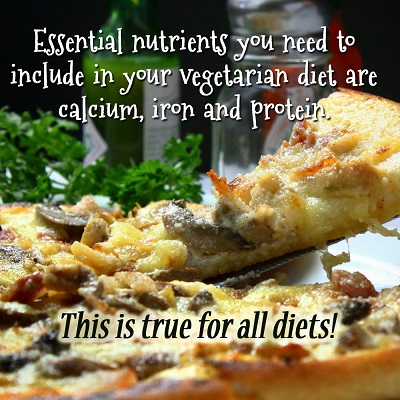 Regardless of what plant-based diet you follow, you need to make sure you get all the important nutrients your body needs for total health and wellness. Some of these essentials include, calcium, iron and protein.
Regardless of what plant-based diet you follow, you need to make sure you get all the important nutrients your body needs for total health and wellness. Some of these essentials include, calcium, iron and protein.
Calcium for Bone Health
Since calcium is one of the major key minerals for bone growth and development, it’s important for vegetarians to get the right amount of this mineral through their diet where possible.
Milk and dairy companies have done a great job in letting us know how great milk is in regards to being a natural calcium source. This claim has worried many vegetarians who have come to believe that by eating only plant-based foods and not drinking milk, they may become calcium deficient.
Calcium for Vegetarians
What many people do not realize is that there is a wide spectrum of plant-based, calcium-rich foods to choose from. There are strong claims made that calcium derived from plant sources is better utilized than that from dairy.
Some of these foods include dark green leafy vegetables, such as kale, broccoli, cabbage, watercress, spring greens and parsley. Other good sources of calcium include lentils, peas, chick peas, kidney beans, parsnips, molasses, oranges, lemons and turnips.
Vitamin D for Improved Calcium Absorption
Vitamin D is an important nutrient for improving the body’s ability to absorb calcium. This is why exposure to sunlight is paramount. Daily exposure to sunlight, as little as 15 minutes per day, is enough to trigger improved calcium absorption, as the sunlight triggers the production of ergosterol. This compound is referred to as pro-vitamin D2 which increases the absorption of calcium from dietary sources into the bloodstream.
The Importance of Iron
Iron is one of the essential minerals that play a major role in transporting oxygen to the cells and in creating connective tissues in the body. The same mineral is responsible for the creation of blood cells and for energy production.
Therefore, if an individual is deficient in iron, they will not only suffer from anemia but several crucial processes in the body will also be affected.
Iron for Vegetarians
Vegetarians can get plenty of iron just by eating plant-based foods. It is easy to assume that vegetarians could be at a high risk of being iron deficient. However, many plant foods contain high amounts of iron. Studies have shown that there is no significant difference between the iron intake of vegetarians to meat eaters.
Vitamin C for Better Iron Absorption
Vitamin C is perfect for helping the body to absorb iron, so, eat vitamin C rich foods along with foods rich in iron to get improved iron absorption.
Vegetables such as bok choy and broccoli are good sources of both iron and vitamin C, so you don’t even have to try to add the two sources together. Other good sources of iron for vegetarians may include dried beans, quinoa, spirulina, white beans, pumpkin seeds and lentils.
If you are a vegan or vegetarian who relies on iron supplements, then you should know that these supplements cannot be absorbed by the body any better (usually less so) than the natural iron found in whole foods.
Experts also advise that tea and coffee are best avoided for at least two hours before meal times, because these beverages contain tannins that inhibit the absorption of iron.
Most cases of an iron deficiency in vegetarians are caused by poor meal planning. If you are a vegetarian and have been iron deficient in the past, take some time to review exactly what you are consuming.
Advantages of Plant Protein
Many believe animal protein is better than plant protein because it is a ‘complete protein’ or ‘whole protein’. Complete protein from animal meats actually makes your body work harder to break down the different amino acids it contains for your body to utilize. This results in slower digestion.
On the contrary, the protein found in vegetables, such as romaine lettuce and spinach, is in a form that is ready to be utilized by the body because they contain easy to absorb amino acids.
When the food we eat does not require extra work for our body to digest, eliminate and absorb the essential nutrients, the more energy our body has to perform other important tasks.
Over time, as you take in more plant-based proteins, your body will be able to heal more quickly and will also have more energy. Plus, plant proteins contain less atherogenic fat and has no cholesterol.
Protein for Vegetarian Diets
One issue that bothers many new vegetarians is how they can get enough protein from plant-based foods. However, it’s not that difficult to incorporate a variety of protein-rich foods into their daily diet.
Here are a few foods to choose from, depending on what type of vegetarian style diet you adhere to.
Lacto-Ovo Vegetarians
Lacto-ovo vegetarians won’t find it too difficult to obtain protein because they can eat dairy products and eggs, which of course include protein. A single egg provides about six grams of protein, while a glass of milk provides eight grams of protein.
If you consume eight ounces of yogurt, you will obtain an additional 12 grams of protein, and a one-half cup of cottage cheese will provide approximately 15 grams of protein.
Lacto Vegetarians
Lacto Vegetarians may consume foods such as cheese and other dairy, plus pulses, nuts and lentils. Meat analogues are also good sources of protein for lacto vegetarians and these are gungo, chick peas, seeds and tofu.
Vegans
Vegans get plenty of protein in fruits, vegetables, beans, nuts and whole grains. If you eat a variety of these foods every day, then you will certainly be consuming the protein your body needs.






